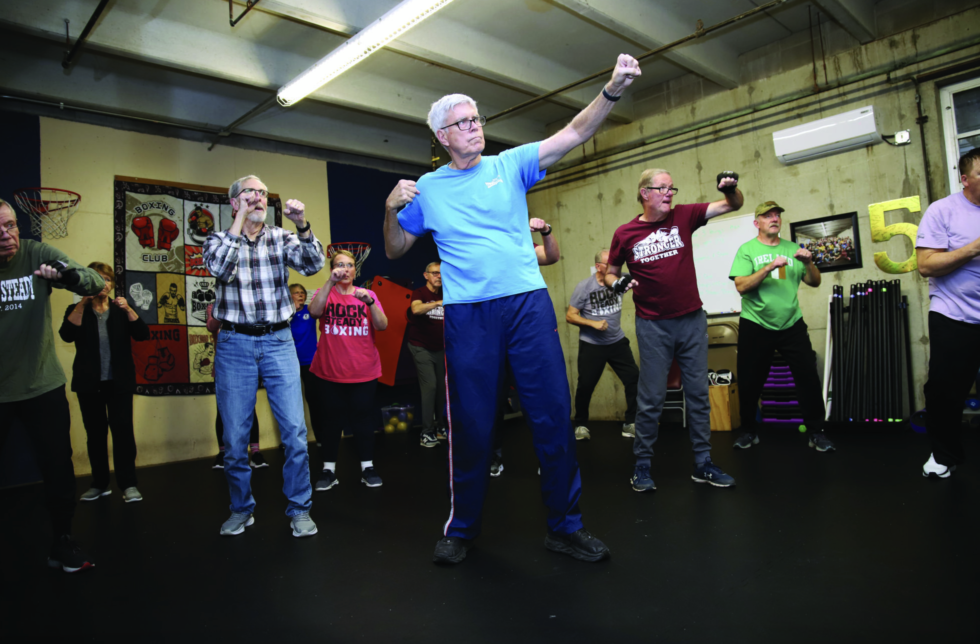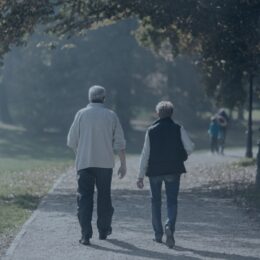
By Ashley Wiehe
Director of Communications
A COMMUNITY OF FIGHTERS
They yell out, “December! November! October! … January!” And then squats for 20 seconds. Next is leg lifts and toe touches.
“We can do anything for 20 seconds,” the coach says.
Now, it’s time for the punching bag. One step, punch, and then reverse. Two steps, punch, punch. And then on to weights. All the while, they are counting, yelling, breathing.
Rock Steady Boxing is a program taking hold across the nation to combat Parkinson’s Disease. Parkinson’s is a progressive disease that affects the brain and the body by attacking the nervous system and the parts of the body controlled by the nerves. Through Rock Steady, participants combine boxing techniques, including balance, vigorous movement, and core strength, with vocal and cognitive exercises, to help to combat those symptoms.
At Lutheran Life Villages, a care facility in Fort Wayne, Ind., Rock Steady is and has helped hundreds of those afflicted by Parkinson’s.
“We’ve had a lot of people come and go through the program,” said Maizy King, director of wellness at Lutheran Life Villages and coach for Rock Steady. “We’ve had people pass away that we’ve loved and that we have tortured, but we really are super proud of the clientele that we do have now.”
Lutheran Life Villages has been offering the Rock Steady program for more than 10 years and was one of the first affiliates in the nation (now more than 800) to offer the Indianapolis-founded program.
“We look at the signs and symptoms of Parkinson’s, and we combat it with an exercise regimen,” King said. “Every single time they come into the gym, it’s a new exercise. … Everything will just kind of be mixed and matched so they really get a well-rounded routine.”
The program at Lutheran Life Villages is offered to their residents as well as any community member who has a confirmed diagnosis of Parkinson’s. The program is led by certified coaches who follow the Rock Steady model.
For each class, they focus on different skills, including core exercises. They vary the warms-ups, the cool-downs, the exercises for the day, and the voice work.
Through the program, participants are constantly yelling and reciting after their coaches. Not only does it keep their minds sharp, but it also helps to keep their throats strong.
“The leading cause of death for people with Parkinson’s is actually aspiration pneumonia,” King said. “We’ve noticed that projection and the voice muscles that you use are very similar (so) the work that we do helps combat that aspiration pneumonia.”
The program also adds in handwriting skills and two-part exercises to help with their cognitive skills as well as connecting to their motion to bring healing in their brains.
“At the end of the day, Parkinson’s is something that affects the brain (because of) a decrease in dopamine
production,” King said. “We do combinations when we box because they have to think about the combination. We do a lot of different things that gets their brains working.”
But, out of all of the workouts, mental exercises, and voice work, it’s the camaraderie that is making the most
impact for those in the program.
“It helps to have people who understand,” said Barb “Bam Bam” Reynolds, who has been living with Parkinson’s since 2018.
Everyone in the class has a Parkinson’s diagnosis—whether mild symptoms at stage one up to the more debilitating stage five. They participate in what they are able and adapt when necessary.
“They are all in the same fight together,” King said.
They start the class each time by saying their boxing names—a fun treat that reflects a personality trait or even sense of humor about their diagnosis—and things that bring them joy.
For Biscuit, it was family.
For Lollipop, it was her grandkids.
For Twitch, it was the Rock Steady class.
“A lot of people add humor to the diagnosis,” King said, referencing boxing names, such as “Twitch” and “Lumpy.”
“My DBS (deep brain stimulation) surgery helped, but it left lumps in my head,” laughed Don “Lumpy” Stroud, who changed his boxing name from “Stinger” to “Lumpy” following his surgery. “It brings out a laugh.”
And the laughter is what is needed—the feeling of not being alone in their fight against the disease.
“It is really a blessing to have this,” said Walt “X” Truesdell who has been with Rock Steady since his diagnosis in 2017. “I’m stronger than I’ve been. It’s well worth it.”
By the end of the class, the breathing is heavy but the sense of accomplishment is strong. They finish by coming together in a group and finish how they start—together.
“We are Rock Steady!” They all yell in unison. “Fight, fight, fight!”


